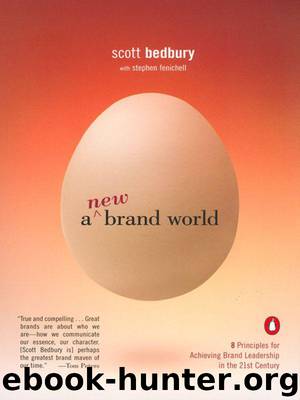A New Brand World: Eight Principles for Achieving Brand Leadership in the Twenty-First Century by Scott Bedbury & Stephen Fenichell

Author:Scott Bedbury & Stephen Fenichell [Bedbury, Scott]
Language: eng
Format: mobi
Publisher: Penguin Group US
Published: 2003-02-24T14:00:00+00:00
MasterCard: Priceless Emotions
Many people in the service industries have a hard time accepting that their “products” rely on emotional connections with consumers. What, they ask, is the emotional depth of the relationship of a credit card holder to his or her preferred brand of card? Thin and tenuous at best, for the most part. But American Express built its success on the momentous discovery that a tiny sliver of plastic can convey a great deal about its holder to others, and touch nearly every level of Maslow’s hierarchy (only to find its success continually eroded by fierce competition in the field). Maslow’s most basic need, for security, is clearly provided by any credit card, because it rests on a bond of trust between merchant, buyer, and bank: no actual cash has to change hands, because all three parties can “trust and verify.” It also conveys security to the consumer because if it is stolen or lost, the loss will not have the same adverse consequences as it would if cash were lost.
The original Amex gold charge card showed that even the color of the plastic can convey social esteem and the inclusiveness of membership in a club. I can certainly recall feeling excluded when, rushing for a flight at an airport in Asia and holding my gold card, to gain admittance to an American Express lounge, I found that admittance was restricted to holders of the platinum card.
Yet viewed from another perspective, the relationship between a card holder and card provider remains by its very nature transactional. Recently, MasterCard imbued its plastic with an explicit emotional connection when their advertising agency, McCann-Erickson, conceived what it called its “reality-check theme”: “The best things in life are free. For everything else, there’s MasterCard.” This was developed into a series of spots that explored the theme of “priceless” moments that occur around events in which the MasterCard can be used. In the campaign a series of transactions are shown, inferring that they were charged to the credit card. At the end of each commercial something occurs that is far more valuable than a hot dog, a Coke, or tickets to a ballgame: the time between father and son, for example.
The “Priceless” campaign was credited by one industry observer with “adding an emotional content to a product normally devoid of emotion.” For the Asian market, a “priceless” moment translated as an expensive round of golf culminating in a “hole-in-one with a witness.” A Latin American version depicted an awestruck young boy meeting his favorite Formula One driver. The tag line: “Stopping [the boy’s heart] at three hundred miles per hour—priceless.”
The “Priceless” campaign struck such a strong emotional chord with consumers that Joseph Tribodi, MasterCard’s VP for global marketing, was thrust into the role of a global Dear Abby. He’s been receiving letters and e-mails daily from people all over the world suggesting their own private “priceless” moments as the basis for future spots. That degree of engagement between a consumer and an ad campaign is rare indeed.
Download
This site does not store any files on its server. We only index and link to content provided by other sites. Please contact the content providers to delete copyright contents if any and email us, we'll remove relevant links or contents immediately.
Hit Refresh by Satya Nadella(9126)
The Compound Effect by Darren Hardy(8949)
Change Your Questions, Change Your Life by Marilee Adams(7761)
Nudge - Improving Decisions about Health, Wealth, and Happiness by Thaler Sunstein(7693)
The Black Swan by Nassim Nicholas Taleb(7110)
Deep Work by Cal Newport(7066)
Rich Dad Poor Dad by Robert T. Kiyosaki(6613)
Daring Greatly by Brene Brown(6504)
Principles: Life and Work by Ray Dalio(6422)
Playing to Win_ How Strategy Really Works by A.G. Lafley & Roger L. Martin(6251)
Man-made Catastrophes and Risk Information Concealment by Dmitry Chernov & Didier Sornette(6007)
Big Magic: Creative Living Beyond Fear by Elizabeth Gilbert(5756)
Digital Minimalism by Cal Newport;(5750)
The Myth of the Strong Leader by Archie Brown(5500)
The Slight Edge by Jeff Olson(5410)
Discipline Equals Freedom by Jocko Willink(5379)
The Motivation Myth by Jeff Haden(5206)
The Laws of Human Nature by Robert Greene(5177)
Stone's Rules by Roger Stone(5081)
